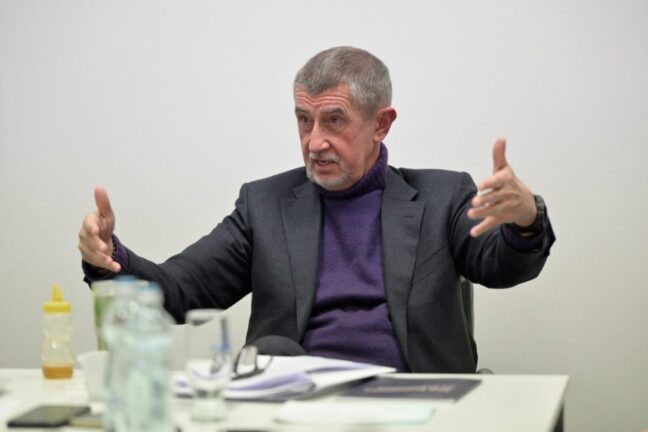Andrej Babiš, a billionaire agri-business tycoon turned populist politician, led his ANO (Yes) party to first place in Czech parliamentary election. Whether, and how, he assembles a ruling cabinet remains less certain. In any case, Prague—until now a reliable advocate of hawkish policies on Ukraine—is likely to drift towards Hungary’s obstructive camp.
Mr Babiš appeared poised to be the next Czech prime minister. With all results in, his party won roughly 34.51 per cent of the popular vote. It translates into 80 parliamentary seats, well short of a majority in the 200-seat chamber. The liberal–conservative Spolu (Together) alliance, the core of the outgoing government, finished runner-up with 23.36 per cent, or 52 seats. Together with the results of smaller parties, the count appeared to translate into 108 seats for Mr Babiš and his likely allies, a comfortable parliamentary majority.
Allies needed
Then again, it ain’t over till the fat lady sings. Before the election, Mr Babiš insisted he wanted to rule alone, claiming, “The best thing for our country in this situation would be a majority single-party government. That would make it possible to quickly deliver on our program without any coalition compromises.” That, however, is unlikely to happen, unless he counts on the tacit tolerance of two smaller parties, i.e. a coalition cabinet in all but a name.
The Spolu alliance refused joining a Babiš-led cabinet, leaving the winner with the choice of parties balancing on the line between populism and outright extremism. These include Freedom and Direct Democracy or SPD (7,8 per cent, or 15 seats) , a nationalist outfit that loathes Brussels, and the right-wing Motorists (6,8 per cent, or 13 seats). On the other hand, Stačilo! (Enough!), a Moscow-friendly far-left grouping which includes the heirs of the former ruling Communist party, did come anywhere close to clearing the five per cent bar to enter Parliament.
The potential allies of Spolu, widely regarded as the pro-democracy bloc, included Starostové a nezávislí (Mayors and Independents, or STAN) and the Pirates. They gained 11.23 and 8.97 per cent, translating into 22 and 18 mandates, respectively. Combined with Spolu, they hold 92 seats; that could give them an razor-thin majority in collaboration with the new parliament’s smallest faction, the Motorists. Ideological differences between these subjects, however, are even starker in this case than in the case of ANO.
You might be interested
Reversing the course
It is the issue of Ukraine what worries most observers. Outgoing Prime Minister Petr Fiala championed a Czech-led scheme to source artillery shells for Kyiv, while his government hosted more Ukrainian refugees per head than any other EU state.
Mr Babiš scorned such largesse during the campaign. He pledged to cut support for Ukraine and declared NATO—and not Prague—should run the ammunition drive. Jan Lipavský, the foreign minister, warned on the eve of the vote, “Today, Czechia is among Europe’s leaders in a firm, principled stance against the Kremlin. A Babiš government would reverse that course.”
Speaking to Britain’s Telegraph last month, Mr Lipavský went further. “Moscow is already rubbing its hands at the prospect of Mr Babiš going soft on Russia; weakening sanctions, scrapping the Czech ammunition initiative, and undoing the restrictions on the movement of Russian ‘diplomats’ that we advanced with close partners.”
Balance tilting against Kyiv
Such language echoes apprehension elsewhere in central Europe. Slovakia has already halted weapon deliveries to Kyiv; Austria and Hungary keep, to varying degrees, cosying up to the Kremlin. If Prague wobbles too, the balance inside the EU could tilt against Kyiv.
Slovak-born Mr Babiš rejects the charge of appeasement. “That we will pull the Czech Republic somewhere to the east is a brutal lie that government politicians just use scare people,” he told Politico. On the stump he thundered, “We’ll never drag the Czech Republic to the East. I can absolutely rule that out.” Yet if he is to govern, he will have to do so with the help of two rabidly anti-Brussels partners.
The best thing for our country in this situation would be a majority single-party government. — Andrej Babiš, winner of Czechia’s parliamentary election
He insists he only wants Brussels to respect national sovereignty and drop what he brands meddlesome regulations—from the Green Deal to the migration pact. Yet the price of parliamentary backing from extremists may include exactly the foreign-policy concessions he denies planning.
Another defection from mainstream
The European Commission also eyes Mr Babiš’s legal entanglements. He still awaits a verdict on allegations that he defrauded EU funds through his Agrofert conglomerate. The dispute over subsidies to his private residence/conference centre dubbed Stork’s Nest revived memories of Hungary’s battles with the European Commission over graft.
Inside the European Parliament ANO sits with Viktor Orbán’s Fidesz in the Patriots for Europe group. That alignment heightens fears that Prague could join Budapest in vetoing sanctions extensions or, less importantly, in watering down climate targets. Petr Kaniok, a political scientist, warned, “I think that the Czech Republic will significantly withdraw from its current activity — both in some political and symbolic dimensions, as well as in terms of actual political decisions.” The EU’s centre-right and liberal blocs, already strained, would then face fresh defections when cohesion matters most.
Moscow is already rubbing its hands at the prospect of Mr Babiš going soft on Russia — weakening sanctions, scrapping the Czech ammunition initiative, and undoing the restrictions on the movement of Russian ‘diplomats’. — Jan Lipavský, Czechia’s outgoing foreign minister
Other than the defence issue, the choice Czech voters faced at the election booth was not particularly wide in terms of European engagement. The ODS, the leading party of the outgoing government left the European People’s Party and helped form the EP’s European Conservative and Refomist group in 2009 (along with the UK Tory party). The government, however, sounded broadly pro-European notes, particularly on Ukraine and defence matters, today’s number one EU priority.
Mixed emotions
President Petr Pavel may yet frustrate Mr Babiš. The former NATO general, himself something of a pro-Ukraine stalwart, hinted he could refuse to appoint ministers who advocate quitting the EU or NATO. He cannot block a government indefinitely, but delay alone could force ANO to seek less radical partners—or soften its platform.
Another thing that could possibly mitigate Mr Babiš’s worst instincts is the fact that a large chunk of his wealth comes from his German business, SKW Stickstoffwerke Piesteritz GmbH. This means his business is to a large extent exposed to German regulatory scrutiny. Stickstoffwerke is part of the Agrofert conglomerate sprawling over three continents. Transparency advocates note that the company belatedly disclosed his beneficial ownership in 2021 (after much prodding from watchdogs). Such sagas could complicate talks on the next EU budget, seek to hamstring rule-of-law conditionality and embolden other illiberal leaders.
I think that the Czech Republic will significantly withdraw from its current activity, both in some political and symbolic dimensions, as well as in terms of actual political decisions. — Petr Kaniok, Czech political scientist
Brussels is therefore watching Prague with mixed emotions: apprehension about another spoiler, but hope that parliamentary arithmetic, business interets, and presidential vigilance will keep the country anchored in the European mainstream. The fat lady is reaching for the microphone.











